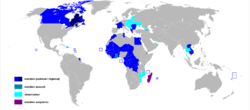International Organization of La Francophonie
 |
|
| Name: International Organization of La Francophonie | |
| Acronym: OIF | |
| Year of foundation: 1970 (ACTC) , 2005 (OIF) | |
Headquarters: Paris (France) | |
OIF documents: go to page | |
OIF official web site: go to page | |
FOCUS ON | |
| Parliamentary Assembly of La Francophonie |
Description
The International Organization of La Francophonie (OIF) was created with the objective of promoting a dialogue to develop a political and economic solidarity between the French-speaking peoples.
Member states
The OIF has 53 member states, namely:
![]() Albania
Albania ![]() Andorra
Andorra ![]() Belgium
Belgium
![]() French Community of Belgium
French Community of Belgium ![]() Benin
Benin ![]() Bulgaria
Bulgaria
![]() Burkina Faso
Burkina Faso ![]() Burundi
Burundi ![]() Cambodia
Cambodia
![]() Cameroon
Cameroon ![]() Canada
Canada ![]() New Brunswick
New Brunswick
![]() Quebec
Quebec ![]() Cape Verde
Cape Verde ![]() Central African Republic
Central African Republic
![]() Chad
Chad ![]() Comoros
Comoros Democratic Republic of the Congo
![]() Republic of the Congo
Republic of the Congo Côte d'Ivoire
![]() Djibouti
Djibouti
![]() Dominica
Dominica ![]() Egypt
Egypt ![]() Equatorial Guinea
Equatorial Guinea
![]() Republic of Macedonia
Republic of Macedonia ![]() France
France ![]() Gabon
Gabon
![]() Greece
Greece ![]() Guinea
Guinea ![]() Guniea-Bissau
Guniea-Bissau
![]() Haiti
Haiti ![]() Laos
Laos ![]() Lebanon
Lebanon
![]() Luxembourg
Luxembourg ![]() Madagascar
Madagascar ![]() Mali
Mali
![]() Mauritania
Mauritania ![]() Mauritius
Mauritius ![]() Moldova
Moldova
![]() Monaco
Monaco ![]() Morocco
Morocco ![]() Niger
Niger
![]() Romania
Romania ![]() Rwanda
Rwanda ![]() Saint-Lucia
Saint-Lucia
![]() São Tomé and Príncipe
São Tomé and Príncipe ![]() Senegal
Senegal Seychelles
![]() Switzerland
Switzerland ![]() Togo
Togo ![]() Tunsia
Tunsia
![]() Vanuatu
Vanuatu ![]() Vietnam
Vietnam
History
The International Organization of La Francophonie was created in an international context dominated by the Cold War and in the wake of the process of decolonization.The Organisation was open to those countries where French was the official language or the main minority language. First inaugurated as the Agency for Cultural and Technical Co-operation (ACTC) and then as Intergovernmental Agency of La Francophonie, it took the present name of Organisation of La Francophonie with the constitutive Charter adopted in November 2005.
Bringing together countries from around the world with a political and socio-economic post-colonial background, the Organization has committed itself to promoting initiatives regarding especially issues such as solidarity, democracy and technological advancement. The protection of linguistic and cultural diversity, the promotion of democracy and human rights, the support for scientific research and education as well as the promotion of sustainable development have been the key objectives on witch the OIF has based its action strategy.
By working with organizations such as UNESCO and creating a structured relationship with other linguistic regions, particularly the English-speaking countries gathered in the Commonwealth, the Francophone Association has played an important role in encouraging dialogue among cultures. The OIF has also intensified its cooperation with the European Union, the African Union and the United Nations, where it gained the status of observer member (1998), with the objectives of conflicts prevention, political stability and fighting against inequalities. Over time the Organization of La Francophonie has actually become engaged in international policy, emerging as an important multilateral cooperation area.
OIF structure and decision-making procedures
The Francophonie Summit
The Francophonie Summit is the highest authority of the organization. Every two years it brings together the Heads of State and Government of member countries. They meet to establish guidelines for cooperation, updating objectives and strategies.
The Ministerial Conference
Annually the foreign ministers of member contries meet with the aim to ensure continuity in terms of policy among the summits.They are called to oversee the implementation of decisions taken in previous summits and to check the working agenda of the next summit.
The Permanent Council of La Francophonie
Made up of the ambassadors of the member countries, the Permanent Council of La Francophonie is responsible for planning meetings between political leaders and coordinating the work of operational agencies.
The Secretariat-General
Created as a political body in 1997 at the Summit of Hanoi (Vietnam), the Secretariat-General is elected every four years by the Summit and acts as the official representative of the organization in international forums.
The Parliamentary Assembly of La Francophonie
Created in 1967 in Luxembourg as the International Association of French-Speaking Parliamentarians (AIPLF), the Francophone Parliament brings together representatives of national assemblies and local governments of member countries and states, once a year in a plenary session. The Assembly has been recognized as having the role of an advisory organization. On the basis of reports submitted by its commissions, the Parliamentary Assembly expresses opinions and makes recommendations to the Summit, the Ministerial Conference and the Permanent Council in all areas of activities relating to the francophone space.
Operational agencies
The most important is the Francophone University Agency (AUF), which is responsible for the implementation (or application) of cooperation programmes adopted at summits.
The other operational agencies are The International Association of Francophone Mayors (AIMF), Senghor University of Alexandria, Egypt, as well as the French-speaking television channel TV5 Monde.
Decision-making within OIF
Within the OIF the resolutions are adopted by consensus. In the case of voting, decisions are made by a majority of nine tenths of the members present and voting. Abstention is not considered a vote.

